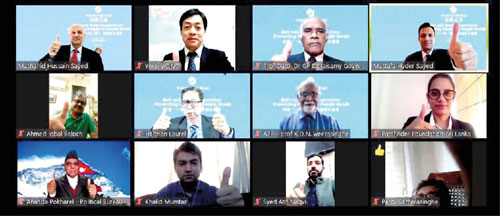Pakistan-China Institute hosted an extraordinary 9-Nation Conference on Regional Economic connectivity themed on “Belt and Road Cooperation: Promoting People-to-People Bond”. The Webinar was attended by the representatives from “Friends of Silk Road” organizations of Pakistan, Bangladesh, Malaysia, Nepal, Sri Lanka and Thailand plus representatives of think-tanks from Indonesia, Philippines and China.
Saying the ‘Asian Century’ needs BRI to progress, the speakers, representing various walks of life called for strengthening multilateral cooperation, promoting Belt and Road Initiative (BRI) as it represents shared interests of Asian countries. They also put forth suggestions for high quality development of Belt and Road Initiative (BRI) through exchanges and consultations. The 9 countries agreed to institutionalize their interaction, counter disinformation and fake news, and rejected any notion of a ‘New Cold War’.
The webinar was moderated by Mustafa Hyder Sayed, Executive Director of PCI. He said that “Friends of Silk Road Pakistan” since its launch in 2019, has provided both a better understanding and information about benefits and numerous opportunities arising out of the BRI through CPEC. BRI, he said, has provided an alternate development model to developing countries for promoting human development, which, before BRI, were dependent on the West and its institutions.
Senator Mushahid Hussain Sayed, Chairman Senate Defence Committee & Pakistan-China Institute said that BRI, through CPEC benefits the people. He said that BRI is not directed against any country and termed it as a win-win model of cooperation, since it is inclusive and aims to promote connectivity.
Professor Wang Yiwei, Director of Institute of International Affairs, Renmin University of China, said that the post-pandemic era is all about adaptation to the ‘New Normal’. He said that in these challenging times, multilateralism is the only way forward, and BRI can be taken as a blueprint to advance multilateralism. He also welcomed China’s Zero Coal policy, which, he maintained, will help in fighting the looming threat of Climate Change.
Kalyan Raj Sharma, General Secretary of Nepal “Friends of Silk Road Club” said that China-Nepal economic relations have been further cemented since the start of BRI and the economic & social development trajectory of Nepal now depends on BRI. He said that the impetus to advance this relationship with China came after India blockaded Nepal in 2015-16.
Dilip Barua, Chairman of “Bangladesh China Silk Road Forum” called for jointly countering the anti-BRI propaganda which emanates from India and Western countries. He termed BRI as an economic masterstroke of President Xi Jinping, which has improved infrastructure in Asia. Moreover, he said there is a positive perception of BRI in Bangladesh, since it has started reaping the benefits of this initiative.
Mme. Dararat Puechmongkol, Assistant Secretary General of Thai-Chinese Culture and Economy Association said that Thailand has been increasingly cementing its relationship with China especially in the context of BRI, accruing benefits for its people.
Professor Dai Yonghong, Director of Institute of Global Governance and Area Studies, Shenzhen University said that the international environment calls for advancing green development, adapting green business practices, and promoting human development.
Prof Gayathri De Zoysa, senior researcher, Pathfinder Foundation, Sri Lanka, said Sri Lanka is one of the most important BRI partner countries and Chinese Foreign Direct Investment has increased significantly since the inception of BRI.
Ananda Prasad Pokharel, Political Bureau Member of Communist Party of Nepal (Unified Marxist-Leninist) talked about the Trans-Himalayan Multi-dimensional Connectivity Network which is an economic corridor between Nepal and China as part of BRI which is an historic opportunity to overhaul Nepal’s infrastructure.
Prof. K.D.N. Weearasinghe, Convener, Asia Progress Forum, Colombo said that BRI has led to the economic revitalization of partner countries. He also outlined the history of China-Sri Lanka relations which date back to hundreds of years and have been strengthened since then.
Ms. Veronika S. Saraswati, from Indonesian think tank, CSIS said the way China contained the global pandemic can be taken as a blueprint by other countries. BRI, she said, has enabled technology transfer between China and partner countries. BRI projects in ASEAN countries are advancing with full speed and new avenues of prosperity and growth are emerging with the passage of time.
Mr. Herman Laurel, Founder of Philippine-BRICS Strategic Studies lauded China’s vaccine humanitarianism which has contributed a lot towards containing the spread of the pandemic.
The participants agreed to institutionalise their relationship through digital partnerships. At the conclusion, Senator Mushahid Hussain thanked the participants and said the real reason for US ire against China is because, as a recent Harvard University study, underlined: ‘China has displaced the US as the world’s hi-tech manufacturer, producing 1.5 billion smartphones, 250 million computers, and 25 million cars in 2020’.










